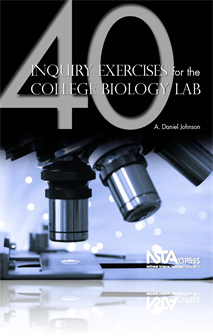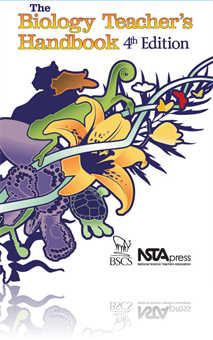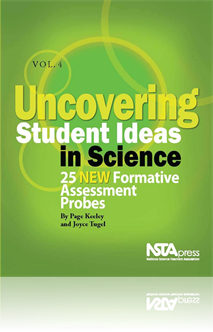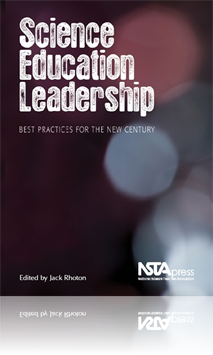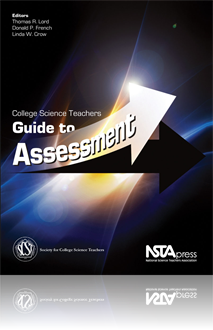All Book Chapters
Book Chapter
An Outcomes-Oriented Approach to Implementing Inquiry
This chapter provides a short overview of the process of curricular planning with special emphasis on inquiry-based instruction. It outlines a validated method that curriculum designers and coordinators can use to establish program goals, select inst...
Book Chapter
Assessing Inquiry-Based Instruction
Assessment encompasses more than just exams and papers. It also involves informally assessing student learning in progress, formally assessing students to determine their learning gains, and assessing whether the current instructional practices and c...
Book Chapter
Teaching Techniques for Inquiry Labs
Chapters 1-3 described general principles of inquiry and processes for developing and assessing an inquiry-centered course. This chapter examines the process in greater detail by outlining specific behaviors and practices that instructors can use to ...
Book Chapter
The Relationship Between Teaching and Learning
This chapter introduces a summary of research about learning and discusses the implications for teaching. The characteristics of professional development are described that can help transform teaching beliefs and practices in ways that address curren...
Book Chapter
How to Use Collaborative Learning in Your Classroom
Educators have been conducting research about the relative effects of cooperative, competitive, and individual learning for several decades. The research shows that collaborative learning experiences tend to promote higher achievement in learners tha...
Book Chapter
How to Use Science Notebooks in Your Classroom
Science notebooks can take many different forms. The important thing to remember is that they should provide a place where student experiences, data, and language can come together to form meaning. This can happen when daily entries lead to conceptua...
Book Chapter
How to Help Students Make Meaning From What They Read
Students need opportunities to develop "reading to learn" strategies. Although many students may have the ability to read text, some lack the ability to comprehend and react to it. The strategies provided in this chapter are designed to support stude...
Book Chapter
How to Help Your Students Evaluate Information
Every day, we are bombarded with information on many issues from a wide variety of sources. Today's students are especially adept at accessing information through the internet. They likely are much less adept at accessing the intent, relevance, and v...
Book Chapter
How to Help Students Construct Their Understanding of Science Concepts
Conscientious biology teachers continually strive to improve their instructional practices to enhance student learning. At the heart of this goal is a focus on making sure that students understand the biology being taught. One important way to increa...
Book Chapter
How to Promote Scientific Conversations Among Your Students
Helping students develop skills for scientific conversation has many benefits. Engaging in scientific conversation elicits students' prior knowledge, enables students to construct their understanding of science concepts, encourages all students to pa...
Book Chapter
How to Use Assessments to Improve Student Learning
The ability of students to “do” biology and to understand biology concepts is essential. Developing biology lessons and assessing for an understanding of biology skills and concepts go hand-in-hand. Well-designed biology lessons result from well-...
Book Chapter
How to Select Programs for Your Inquiry Classroom
Besides teachers and students, the most consistent presence in school science is the instructional materials. BSCS, in collaboration with the K-12 Alliance of WestEd, developed a process and set of tools to help teams of science teachers analyze inst...
Book Chapter
BSCS's Influence in Biology Education
This chapter describes the dominating concerns in science education over the past 50 years. It also discusses the way BSCS has addressed those concerns through curriculum and professional development and through research and evaluation. The chapter i...
Book Chapter
A BSCS Perspective on Contemporary Biology Education
This chapter arises from an opportunity to pause and reflect on biology education in the past and what it will be in the immediate future. Four themes are featured that address the topic of biology education—implementation of fundamental biological...
Book Chapter
This chapter outlines three major areas that play a role in equity in the science classroom—addressing issues of bias, making connections between science and society explicit, and helping students cross the border into the culture of science—each...
Book Chapter
Unifying Principles of Biology
This chapter outlines six unifying principles educators can use to organize biological concepts, thus helping to unify the otherwise disparate facts of biology. These unifying principles represent a comprehensive foundation for the biological science...
Book Chapter
Attending to Conceptual Challenges
This chapter examines some of the conceptual and reasoning difficulties commonly encountered within each unifying principle of biology, as well as those iinherent to understanding the nature of science. Suggestions are provided for teachers to uncove...
Book Chapter
Getting Started With Inquiry: Six Invitations
Student participation in inquiry serves two objectives—first, students discover that science is something more than merely learning what others already know—and second, students develop skills in interpreting data and in understanding scientific ...
Book Chapter
In the full inquiry experience in this chapter, students will put skills of inquiry together as they think like scientists and apply critical-thinking skills to evaluate new information that they collect themselves. In full inquiry, students assume m...
Book Chapter
Perspectives on Contemporary Controversial Topics in Biology Education
This chapter describes three different types of controversy and makes the case for including controversial topics in your course syllabus. It offers suggestions for handling these topics in a way that helps students apply their scientific understandi...
Book Chapter
How to Set Up and Manage Your Biology Classroom
There are a number of important practical aspects to setting up and managing a biology classroom. These include strategies for organizing students into groups, conducting laboratory work, maintaining live organisms in the classroom, leading field tri...
Book Chapter
The purpose of this assessment probe is to elicit students’ ideas about infectious disease. The probe is designed to find out whether students use the germ theory to explain what causes an infectious disease like the common cold. This free selectio...
Book Chapter
The Role of Leadership in Fostering Inquiry-Based Learning and Teaching
In this chapter, the author first address the concepts of inquiry and leadership presented in the National Science Education Standards (NRC 1996). Then presents examples of leaders who foster inquiry-based learning and teaching within the context o...
Book Chapter
Bending the Professional Teaching Continuum: How Teacher Renewal Supports Teacher Retention
This chapter is built on the premise that science teachers develop their practice along a professional continuum that consists of recruitment, preparation, new teacher induction, ongoing professional development, and advanced certification or master ...
Book Chapter
No Boundaries: The Role of Mobility in Recruiting New Teachers and Developing New Leaders
The development of teacher leaders in any discipline is hindered when the pool of available candidates is shallow, and developing science leaders—whether at the classroom, district, state, or national level—largely depends on having a rich and ro...
Book Chapter
Professional Learning Communities: School Collaboration in Implement Science Education Reform
It has never been more important for teachers to work together. We must learn from each other, open up our classrooms, share student work, serve as mentors and coaches, and work with mentors and coaches. Until recently, training and professional deve...
Book Chapter
This chapter addresses how to create a community of minority science teacher leaders who are not only committed to teaching in urban schools, but also to helping close the achievement gap, especially in the area of science education. It also explores...
Book Chapter
Assessing Assessment to Inform Science Leadership
This chapter uses the ReaL Earth System Science project as a metaphor for investigating the landscape of assessment in science education. This framing turns the focus of the five questions away from the Earth system and toward the system of education...
Book Chapter
Care to Share? The Marymount School Science Department Professional Development Program
This chapter reveals how one school, The Marymount School of New York, developed a goal-setting model. This model effectively promotes innovation in the classroom, in the curriculum, and in the school and involves teachers in the decision-making proc...
Book Chapter
Leadership for Public Understanding of Science
Science is generally considered to be one of the most important subjects in the school curriculum, even if it does not receive as much attention as math and reading-language arts, which have always formed the central core of the elementary school cur...
Book Chapter
Science Communication and Public Engagement With Science
It is the responsibility of all who have a passion for science and science education to serve as ambassadors of science because we need as many great communicators of science as possible. The first section of this chapter provides useful tips for edu...
Book Chapter
The Many Faces of Leadership in a Complex Environment
While the full implementation of the leadership approach recommended in this chapter has many facets, the foundation of that leadership style is to “keep you eye on the prize.” That is, every decision should consider at its nucleus how it will su...
Book Chapter
Content Coverage in the Role of Instructional Leadership
The variability in content coverage is likely to produce differences in student learning outcomes. The authors use this variability to reinforce their view that the management of content coverage, including association time allocation, is among the m...
Book Chapter
The Role of Teacher Leadership in Science Education
Professional development activities deepen content knowledge, support inquiry-based teaching, help teachers tap into student thinking, and assist in implementing curriculum materials and interpreting assessment systems. This chapter examines teachers...
Book Chapter
Getting Results From Science Teacher Leadership: The Critical Role of Principals
There is growing evidence that teacher leaders and principals are indeed effecting-and perhaps-essential allies in leading schoolwide improvement in teacher effectiveness and student learning. This chapter opens with a detailed look at the empirical ...
Book Chapter
Developing and Sustaining Leadership in Science Education
It can be argued that the most important guiding force leading to a teacher’s continued improvement is having a good role model, such as a colleague who is an experienced leader. This chapter provides a detailed description of a master’s degree p...
Book Chapter
Technology Leadership for the 21st Century
This chapter addresses (a) how transformational leadership in the educational community is crucial for effective and appropriate infusion of educational technology as a fundamental part of K-12 education; (b) how educational leaders can create a robu...
Book Chapter
Change in Secondary Science Settings: A Voice From the Field
Learning science by inquiry is central to science education reforms. In today’s working world, students need skills for finding, organizing, and managing information. They also need rich skills for working with others and for communicating orally a...
Book Chapter
Building a Culture of Faculty-Owned Assessment
With so much at stake for both students and institutions, it is imperative that colleges and universities support faculty and others in comprehensive assessment efforts and act on changes suggested by assessment data. If higher education is to mainta...
Book Chapter
At Montana State University (MSU) a variety of strategies have been used to begin to quantitatively assess how students are learning in the science classroom. The author reviews in this chapter some of the work that has helped MSU craft quantitative ...



